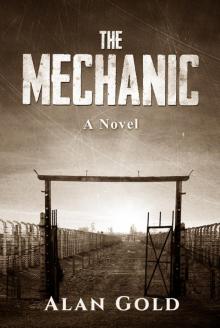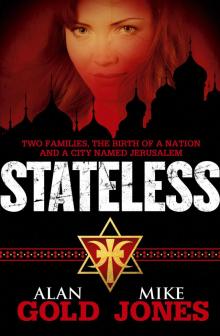The Mechanic Read online
Page 3
The prisoner was surprised. Yesterday, they had appeared in court for the first time, and things were said, but his American lawyer had demanded that the matter be adjourned for some time in the future. It was all beyond Deutch, but now they were suddenly called again. Why?
The guard said nothing more. He just waited for the prisoner. He held him in neither greater nor lesser disrespect than any other of the prisoners in this wing. He’d been told something of what they did. Mobile killing or gassing units or something. Anyhow, the court would take care of them. He watched and waited an additional moment for the prisoner to rouse himself from the bed, and to straighten his clothes. He was being deliberately slow. As much an act of dignity as of defiance. And so to the courtroom. But the guard didn’t care. The Nazi bastard would soon hang, and that would be that. So let the motherfucker have his moment of victory.
The guard stifled a yawn. Too much beer and poker last night. This whole thing of guarding Nazis was all so second rate. So much an afterthought. If it came to an end today, nobody would notice a thing. Even the prosecutors seemed to be anxious for the show to be over. Like a five-act Broadway play which should have finished at the end of the third act, the audience was yawning and was only interested in getting home.
The prisoner joined his co-defendants as they walked behind a squad of armed guards and climbed the stairs to file into the courtroom. They knew they were all going to their deaths, but it was a moment of change, and charge was a kind of freedom.
They were instructed to sit where Göring and Dönitz and Frank had once sat, and put on their headphones. Like the leaders of the Third Reich during their trial, he and his fellow accused wore no uniforms. They were dressed in sober business suits, as though they were in the pews of a church, listening to a preacher. But this church was all about sin and guilt, for it was the pulpit of Savonarola, and his bony finger was pointing to their culpability.
They all stood as the tribunal of judges filtered into the court to take their seats. The high and mighty of France, Britain, and Russia were sitting with the American judge as colleagues. But although it was the American’s court, all the others were still judging the cogs of the machinery of the State of Germany.
The high-pitched voice of the German interpreter invaded the silence and hurt his eardrums until he adjusted the earmuffs. The words were uttered in a monotone, all the statements made about the different participants being translated by the same man; the Germans had to strain to determine who was speaking.
‘Prisoners at the bar. The court is now in session. Day Two of the deliberations of the Judicial Bench of the Control Council, American Sector of the occupied former state of Germany are now proceeding. The Honourable Justice Arthur Griegson presiding. Sitting in conjunction with his Honour are judicial observers from the Allied nations of France, Great Britain, and Russia. Yes, Mr. Prosecutor. May it please Your Honour and Your Honour’s colleagues. Yesterday we heard evidence of the way in which the defendants, Matern, Haubach, Fegelein, and Deutch were responsible for increasing the capacity of the ovens of the death or extermination camps at Sobibor, Treblinka, Auschwitz-Birkenau, and Belzec to deal with increasing numbers of prisoners from April 1944 onwards. Your Honours, this court has been reconvened because the Defense counsel for the prisoner Deutch wishes to make special application. Yes, Mr. Prosecutor, we have had notification from the counsel for defense for the prisoner Deutch that he wishes to challenge certain aspects of the evidence you are about to present. Sir, I’m aware of the defense challenge, and I believe that the evidence I am about to present …’
And so it went on. No modulation in the translator’s voice. No variation when he was translating the words of different speakers. Each statement running into the next person’s statement in the same monotones enunciated by the bored translator. Sometimes, it was impossible to determine which of the speakers the translator was translating … Was it their defense lawyers or one of the judges …?
At the beginning of their trial, all the defendants had met together in the large holding cell below the courtroom where they ate their lunch. They agreed to complain to their defense lawyers before the court resumed, but it hadn’t been an easy conversation. The lawyers made it very obvious that they were representing them because they’d been appointed by the courts, and certainly not because of any love for them. And worse, there were no German advocates who would defend them, because all the available ones to the major criminals were suddenly unavailable to these defendants, who were small fry in the scheme of things.
And so they were forced to use Americans or British or, God forbid, Russians; why couldn’t they have found defense lawyers who were German? And their foreign lawyers made it absolutely clear that, even though they would use every effort to persuade the judges of their clients’ collective innocence, the lawyers’ every gesture, every movement, left the prisoners in no doubt that they felt dirty and disgusted they were forced to represent such beasts. And the beasts even felt diffident complaining that they couldn’t properly understand the proceedings, because the translator they were forced to use to speak with their lawyers was the same translator about whom they were complaining for his incomprehensibility in the court. The verdict would be guilty and they’d all hang, so why bother complaining?
And so on this second unexpected day of their trial, events had begun. But before the court settled down to further accusations and evidence, Deutch suddenly pricked up his ears and listened intently to the translator’s monotone. His lawyer was on his feet, arguing. He tried to comprehend what was going on. Words like ‘unfair’ and ‘natural justice’ were bandied around. Why couldn’t they speak in German! His name was used often; it carried into his consciousness through the headphones, almost musically above the rest of the words his lawyer and the prosecutor were using. Suddenly the translator said something which he recognised had been said by the judge. ‘The defendant Wilhelm Deutch will stand.’
It took a moment for him to realise that all eyes in the courtroom were on him. He glanced at his fellow defendants, who gave him quizzical looks.
‘Wilhelm Deutch, do you understand the nature of the request which your counsel has put to this court?’
Wilhelm looked around to determine who was speaking. It was the only way he could make sense of the translations. He locked eyes with the central judge on the bench, the most senior of the men in robes, and realised that it was he speaking to him.
He held the earphones closer to his ear, as thought this might assist him in understanding.
‘Do you understand what your defense counsel, Dr. Broderick, has asked of this court, Mr. Deutch?’ repeated the judge.
Wilhelm looked at his lawyer, who stared back blankly. Wilhelm held him in utter contempt. The man was a typical patrician American, full of lofty ideals and nonsense. Through him, he’d be hanged.
He said to the judge, ‘I’m sorry. Because of the inadequate translation, it is very hard for me to fully comprehend what is going on. Could you please repeat what I’m supposed to have heard.’
‘Dr. Broderick, your counsel, has made a formal request that your trial be truncated at this time, and that you stand trial separately of your co-defendants. Are you in agreement with our proceeding to hear his submissions that you stand separate trial?’
Now Wilhelm remembered what his lawyer had said to him last night. He’d ignored it because it was all legal mumbo-jumbo. Something about tar and brushes. About how as an engineer in the death camps, he wasn’t as complicit as the other co-defendants who had been in the Einsatzgruppen, truly evil men who had been seconded when their work on the construction and servicing of the mobile gassing vehicles had come to an end. Yet the American lawyer had insisted that as Wilhelm was a plumber turned engineer in Mannheim before the war, he was unfairly caught up in the machinery of evil and shouldn’t be treated as though he was like the others, or some such thing. Either way, Wilhelm wasn’t particular interested in a separate trial. He would hang and would ra
ther hang with comrades.
‘No. I want no separate trial. I want this over and done with.’
Theo Broderick, his lawyer, looked at him in surprise. Last night, his client had said to him that he could do whatever he wanted to do. Amazed, the lawyer quickly melted back to his seat. He returned to the role he was paid to perform, a lawyer, a ringmaster defending the beasts. By his manner, Wilhelm could tell that the American was sitting there with the other defense lawyers feeling considerable disquiet. And discomfort.
CHAPTER TWO
New York, November, 1998
CHASCA BRODERICK FOUND NEITHER incongruity nor incompatibility in upholding the majesty of the law and its handmaiden, truth, as an officer of the courts of America, and yet at the same time lying through her teeth to her parents.
Even though she was twenty-seven years old, it was only in the last couple of years that she no longer felt a deep and profound sense of shame when she told her parents a lie. She’d lied when she lost her virginity, she’d lied as a twenty-two-year-old when she told her parents that she was going on a weekend trip to Florida with her roommate, instead of admitting it was with her boyfriend, and she’d lied when she told them she couldn’t come home from college for a big family function because of the pressure of study for an exam, when she’d already taken the exam and was spending the time at a rock festival.
But what Chasca found most amazing about her relationship with her parents was the fact that she had to lie. She never lied to friends, not even about the slightest thing. Indeed at Harvard, and latterly at the War Crimes Commission, she was often called ‘Your Honour’ because of her uncompromising attitude to moral rectitude.
Even as a little girl, she’d been the conscience of the family, refusing to allow her mother to purchase food grown in South Africa, or anything made in Britain after the Brixton race riots. But as she grew older and saw more of injustice and immorality, she came to the understanding that when she lied to her parents, it wasn’t altogether her fault, that her parents brought these little dissemblings and lies upon themselves … that if they were more reasonable, less controlling, more liberal, more accepting, she wouldn’t have to lie to them.
And so she wasn’t overwhelmed by conscience when she lied and assured her parents that she wouldn’t follow through with the nonsense of that old trial Theo had been involved in, when in reality, it was just below the surface and germinating in her mind like a spring bulb. She’d taken a month’s holiday from her work in the War Crimes Commission examining the behaviour of evil individuals in the genocidal armies which had fought in Croatia and Bosnia, and was thinking of spending time in California or on the snowfields of Colorado. But when the family had returned home from Cape Cod and she’d seen the people she wanted to visit, and the plays she’d wanted to see, her mind continued to wander back fifty odd years to the Nuremberg trials, and the fate of a poor, hapless, and wrongly accused man named Wilhelm Deutch.
Chasca was all too used to the prostitution of justice; she’d studied how corrupt judges had been part of the venality of regimes in wartime Germany and post-Colonial Africa and Asia and South America; but she’d never associated the abuse of justice with an American Court, even one which operated in Nuremberg and was charged with prosecuting the most evil men who had ever lived.
She went to a law library at New York University and read and studied the opening and closing statements of the Chief Prosecutor at the Nuremberg War Crimes Tribunal, the former US Attorney General Robert Jackson, whose words stood as a monument to the centrality and majesty of justice.
But somehow, in the case of this unfortunate defendant, Wilhelm Deutch, the justice system had gone horribly wrong. Her grandfather’s defense had patently failed to find any answer to the prosecution’s claim that Deutch was an ordinary man doing evil things, and so deserved to be hanged as a war criminal. Yet if the judges had seen the autobiography that she held in her hands, a contemporaneous diary written in the passionate words of a Jewish inmate of the concentration camps. which lauded the life-saving compassion of the defendant, the German mechanic would not only have been freed, but would have been treated like a hero.
What was he like, she mused? It was important for her to imagine the architecture of a man like Deutch; she had to picture him, so that the bleak words she’d read about the trial became flesh and blood. Was he tall and thin with a monocle, aristocratic and very proper and Germanic, clicking his heels and kissing the backs of women’s hands? No, of course not … He was a mechanic, undereducated, but highly skilled if the testimony of this Jewish gentleman, Joachim Gutman, was to be believed.
So what did he look like? Short, stocky, heavyset, a face full of jowls, fat from sausages and beer and sauerkraut? Maybe he was one of the rollicking caricatures of the German music halls and bierkellers, an archetypical Herr, full of good nature and merriment and pinching little pigtailed mädchen on their rosy cheeks? Or was he dour and ordinary and smelling of pipe tobacco, his clothes full of the stains of oil and sludge and drudge from a lifetime of doctoring machinery? Maybe he was partially deaf from standing in noisy factories. Did he wear glasses, and if so, were they the round, old-fashioned type which you used to be able to get on the National Health Service in the United Kingdom or that the Puritans wore all those centuries ago, thin-framed spectacles with wires which you sort of threaded around the ears? Or were they horn-rimmed and very heavy, framing his face and making his eyes seem to bulge? Maybe a monocle? No, she’d already mused about monocles and dismissed them. Monocles belonged to the patrician, heel-clicking type of German, and because Deutch was a mechanic, he didn’t fit into that category in her mind. She tried to stop herself musing, because she was imagining through stereotypes, and stereotypes led to racism, and she’d spent her whole life fighting racism.
But she couldn’t let it go. What did he look like? How did he talk? With a lisp? Slurring his words? In clipped, Germanic cadences or in Hitlerian demonic sentences delivered at full throttle to an hysterical and adoring audience? Now she was being absurd! No, he was an ordinary man, a loving father and husband, possibly even a grandfather; he had a dog and a couple of cats; yes, okay, so he went hunting stags and wild boar in Bavaria and enjoyed killing them, but so did all other Germans before the war; no, he just hunted wild boar … Not stags, he didn’t enjoy killing the stags.
My God, she thought, how could she ever truly imagine a man whose culture and nature were so diametrically opposite to her own? Especially such an ordinary man, caught up in the maelstrom of utter evil?
She was beginning to obsess over him and the unfairness of sending a good man to the gallows. She’d tried to put him out of her mind and enjoy her well-deserved break from the genocidal bastards of the broken-down Yugoslavia, but he was starting to dominate her life. Even when she was visiting good friends just for a social moment together and the introductory pleasantries and reminiscences were over and done with, the testament she had found in Theo’s desk was the first thing she brought up. Initially it was in the form of a request for advice … ‘What would you do if you’d found such an ancient injustice …?’ But Chasca knew exactly what she was going to do, and merely wanted her friends’ support.
So when she told her parents, the matter was settled in her mind! She knew exactly what she must do; indeed, she’d dismissed and already forgotten their injunction for her to put it behind her.
Chasca Broderick got a surprise when they reacted so antipathetically. ‘Israel? For God’s sake, why Israel? It’s so dangerous over there. The Palestinian terrorists …’
She told them why she wanted to go, despite the upsurge in the daily horrors suffered by the Israelis. Her father reacted with characteristic techniques of management. ‘Now look, young lady. I thought we’d made it perfectly clear that we don’t want you chasing after some long-dead Nazi … and anyway, you told us that you were going to drop this silly notion …’
Her mother used the power of reason. ‘What chance do you think you ha
ve with the Israeli authorities after all these years? And the man was a Nazi …’
So Chasca explained, cajoled, and in the end realised that logic had no place in her relationship with her parents. ‘Mom, Dad, I’m going to Jerusalem. I’m going to Yad VaShem. I’m going to give this document to them. Then it’s up to them as to what they do with it. End of story. No more discussion. That’s it. Okay.’
Her mother asked pointedly, ‘What’s this Yad … whatever you call it?’
She’d read the documentation in the New York City library, and could answer with authority. ‘Yad VaShem means ‘an everlasting name,’ and it’s the memorial to the six million Jews who died in the Holocaust. It comes from a verse from the prophet Isaiah. It says, ‘And to them will I give in my house and within my walls a memorial, an everlasting name that shall not be cut off …’
Her father looked at her mother and shrugged. Then, with a final philippic, he said, ‘Look, I can save you a journey. Let me get my secretary to send it over to them by UPS and then you can spend the rest of your holiday with us.’
Yad VaShem, Jerusalem, Israel, November, 1998
Chasca remained silent as she stood in the Hall of Remembrance in Yad VaShem in Jerusalem. It was a vast dark hall, only dimly lit by its permanent memorial flame burning close to the crypt which held the ashes of some of the millions and millions who died in the Nazi atrocity. On the floor, in stark relief against the blackness of the marble, were recorded the sites of the European death camps, Majdanek, Chelmno, Auschwitz, and many others, simple names, simple and unexceptional towns, once unknown but now and forever infamous, names which defined the agony of millions of deaths in the name of a lunatic, in the name of a nation’s hatred.
As she stood beside her guide and translator, for the first time in her life, Chasca began to realise the enormity of the devastation wrought by the Nazis. And unwillingly but inevitably, she began to compare the crimes the Nazis had perpetrated during the Holocaust against the Jews, Gypsies, homosexuals, intellectuals, and other sub-humans with the crimes and the genocide she and others were exposing today in the dilapidated state of Yugoslavia. The recent unearthing of the horrors of ethnic cleansing and the slaughters of hundreds of innocent Serbs and Bosnians and Croats by fascist and murderous armies were on the front pages of newspapers throughout the world.

 Birthright
Birthright The Pretender's Lady
The Pretender's Lady The Mechanic
The Mechanic Bloodline
Bloodline Bell of the Desert
Bell of the Desert Bat out of Hell
Bat out of Hell Stateless
Stateless